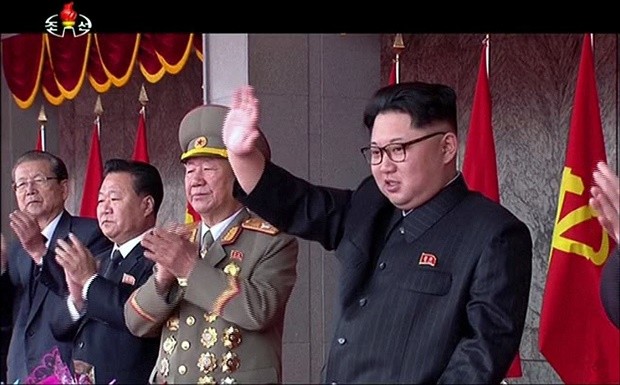US punishing North Korean leader for human rights abuses
WASHINGTON — The US imposed sanctions Wednesday on North Korean leader Kim Jong Un and 10 other top officials for human rights abuses in an escalation of Washington’s effort to isolate the authoritarian government.
Although North Korea is already sanctioned to the hilt because of its nuclear weapons program, it is the first time that Kim has been personally sanctioned, and the first time that any North Korean officials have been blacklisted in connection with rights abuses, such as running the nation’s notorious gulag and running down defectors.
“Under Kim Jong Un, North Korea continues to inflict intolerable cruelty and hardship on millions of its own people, including extrajudicial killings, forced labor, and torture,” Adam Szubin, acting under secretary for terrorism and financial intelligence, said in a statement.
Szubin said the sanctions demonstrate the United States’ “determination to see them stopped.”
The Obama administration — with some prodding from Congress, which passed hard-hitting sanctions legislation in February — has cranked up economic restrictions on Pyongyang since it conducted its latest nuclear test in January.
READ: North Korea leader brags missile threatens US Pacific bases
Wednesday’s action coincides with the release of a State Department report, mandated by Congress, on human rights abuses in North Korea. Administration officials said it was intended to name and shame responsible officials in North Korea’s opaque government, and send a message to lower and mid-ranking officials to think twice before engaging in acts of cruelty and oppression.
“It really for the first time puts them out in the public domain in a way that they haven’t been necessarily before,” said State Department spokesman John Kirby.
US Ambassador to the United Nations Samantha Power said the sanctions “represent the start of what will be an ongoing process to identify and name persons responsible for serious human rights abuses.”
“These efforts send a clear message — not just to the senior leaders, but also prison camp managers and guards, censors, secret police, interrogators and persecutors of defectors — the world is documenting your abuses, and they will not be forgotten,” Power said in a statement.
In addition to blacklisting Kim for human rights violations by his government and the ruling Communist Party, the Treasury Department also blacklisted officials at the Ministry of State Security — which administers political prison camps and is engaged in torture and inhumane treatment of detainees — and the Ministry of People’s Security which operates a network of police stations, interrogation centers and labor camps.
The State Department said that political prison camps are estimated to hold between 80,000 to 120,000 prisoners, including children and other family members.
Those blacklisted include Choe Pu Il, the minister of people’s security; Choe Chang Pong, the director of the ministry’s investigations bureau, who is reportedly responsible for monitoring residents in the North Korea-China border area and arresting and interrogating defectors; Cho Il U at the Reconnaissance General Bureau, who reportedly is in charge of overseas espionage operations; and O Chong Kuk, who is reportedly in charge of North Korea’s infiltration operations into South Korea.
The penalties, which also hit North Korean agencies responsible for propaganda, freeze any property that sanctioned individuals have within US jurisdiction and prohibit Americans from doing transactions with them.
There are precedents for the US putting heads of state on the Treasury blacklist. Among currently serving leaders, they include Syrian President Bashar al-Assad, Zimbabwean President Robert Mugabe and Belarussian President Alexander Lukashenko.
But blacklisting Kim, the hereditary leader who took power in North Korea after the December 2011 death of his father Kim Jong Il, signals an intensification of US pressure against Pyongyang.
North Korea has repeatedly defied the UN Security Council with its nuclear tests and ballistic missile launches. In 2014, a UN commission concluded that crimes against humanity had been committed by North Korea and recommended a referral to the International Criminal Court — a step that China, the North’s traditional ally and veto-wielding permanent member of the council, opposes.
In all, Treasury imposed penalties on 11 officials and five government entities on Wednesday. Four of the individuals and three of the entities had already been sanctioned.
North Korea is already excluded from the US financial system, so the latest action is largely symbolic. Last month, the Treasury Department declared North Korea a “primary money laundering concern” — the toughest action it can take to discourage banks in any jurisdiction dealing with the country.
READ: UN imposes toughest sanctions on N. Korea















